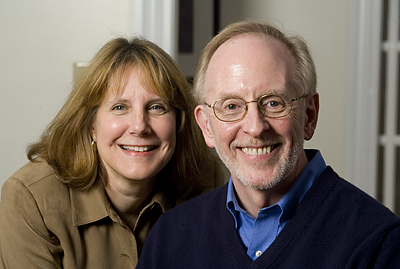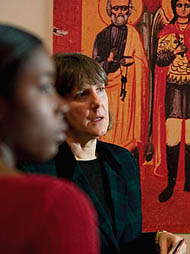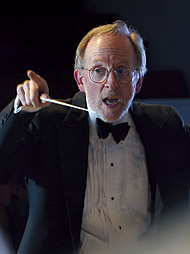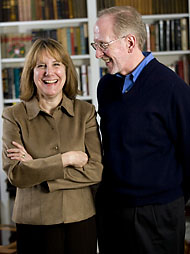Meet the Corries
If you were on College Street one summer day in 2005 and heard three men singing Italian arias, it was neither a stereo nor a dream.
One singer was John Corrie, director of the Bates College Choir and husband of art historian Rebecca Corrie. Another was Ottavio Lattanzi, an Italian-born building contractor. The third was Marshall Karpel ’08, one of John Corrie’s voice students.
That day, Karpel was building his bed loft in the Corries’ garage and Lattanzi was repairing their house. “Ottavio was hammering away,” Karpel recalls, “John was puttering around, and I was building my loft. And we were just singing Italian songs.”
Such a scene likely wouldn’t surprise anyone who knows the Corries. “There’s no distinction between academic and personal life,” says Karpel, “and I mean that in the best sense.”

Arias in the afternoon notwithstanding, the Corries see little remarkable about this kind of engagement. It’s the Bates way, says John. “Essentially, students have a sense that we care,” adds Rebecca, sitting with John one morning in the Den. “I really do like the students, and I like to see them do the things that they would love to do.”
Stories abound about the Corries’ willingness to go to extra lengths for students. John “got me a job a couple of years ago singing French Masses in a church in Lewiston,” says Marsha Larned ’07, a double major in French and sociology who studies voice with him and sings with the choir. “He connected my academic interests to my extracurricular interests.”
“I feel like he’s looking at students very much in that sense of, ‘Who are they as a person, and who are they as a student?’”
The stories often seem to involve baked goods. As adept in the kitchen as at a harpsichord, John is renowned for ending the choir’s concert seasons with cheesecake parties. “The cheesecakes are like pieces of art,” says Christine Fletcher ’07, who knows him from the choir and voice lessons. “His other job could be a baker.”
“It’s about a week of baking. It takes over our refrigerator,” Rebecca says.
There are harder things in life than a refrigerator stuffed with cheesecake. But, seriously, the Corries’ kind of professional dedication — entailing evening and weekend work, traveling, and simply having one’s head in the job a lot — can test other aspects of a relationship.
“It’s one of the things we’ve been talking about even this year,” Rebecca says. Bringing a typical determination to the issue, the Corries are deliberate about reserving time for themselves as a couple. “We really do have to set aside time to be together, and during the school year that’s really hard,” she says.
“It’s something that we can never lose track of, because you could, and you shouldn’t.”
Prolific and innovative in her research, Rebecca is one of this country’s few outstanding specialists in 13th-century Italian art. In that field, “there isn’t anybody that doesn’t know who she is,” says Kathleen Schowalter ’95, who studied with her and is now a medieval art historian herself, on the faculty at Beloit College.
 |
|
Phillips Professor of Art and Visual Culture at Bates, Rebecca Corrie is expert in Crusader, Islamic, Italian and Byzantine art. |
Phillips Professor of Art and Visual Culture at Bates, Corrie is expert in Crusader, Islamic, and Byzantine art as well as Italian. (Fittingly, a primary focus of Corrie’s research is illustrated choral manuscripts.) New York’s Met and the Getty in Los Angeles are among the art museums that have benefited from her scholarship.
Raised in Metuchen, N.J., Corrie “grew up surrounded by art,” she says, and was captivated by the beauty of the medieval Italian work. But her discipline feeds other fascinations, too. “I’m endlessly curious about the past, and endlessly curious about other cultures,” she says, and art history affords a powerful lens for studying economics, politics, and other facets of a time and place.
“The world that I walk through most of the time is a multilayered, multicenturied world,” Rebecca says. “And I like it that way.”
John Corrie’s world has its own many layers. A singer and keyboardist as well as choral director, well-known in Maine musical circles, he is popular with his students thanks to both expertise and kindness. “In choir, people will sometimes describe things as being very ‘John,’” says Karpel, “meaning very good, very exemplary, very wonderful.”
 |
|
John Corrie “has this unbelievable passion for what he does,” says a student. “That comes through to students.” |
Like most musicians, Corrie has assembled part-time jobs into a full-time-plus occupation. A lecturer at Bates, he runs musicianship labs, teaches, and has directed the college’s 70-voice choir since 1986. An experienced instrument builder, he also maintains the College’s harpsichord and fortepiano.
On top of all that, Corrie is choir director and organist at a church in Falmouth; teaches privately and performs around the region; and, notably, last year became artistic director of the Maine Music Society, whose Androscoggin Chorale and Maine Chamber Ensemble offer several concerts a year. (On March 31, the Bates choir and orchestra, the MMS, and two local high school choruses will join forces for the first time, in a program centered around Brahms’ monumental German Requiem.)
Corrie “has this unbelievable passion for what he does,” says Fletcher. “That comes through to students.”
It started early. As he grew up in Buffalo, N.Y., his whole family sang, he says. “We were sort of a mini version of the Von Trapp family.” And music for him now, he says, “is very spiritual. It’s dealing with stuff that you can’t express in words,” he says. “Much like art — when you see something beautifully painted or sculpted, it speaks to you in a way that becomes infinite.”
Music, in fact, brought the Corries together, in 1968. They met through a musical crowd at Oberlin, where John earned his B.A. at the Conservatory and Rebecca, her B.A. and M.A. “One day we ran into each other twice,” Rebecca recalls. “John said, ‘Do you want to go for a cup of coffee?’ And that was it.”
They married in 1969, had a daughter, Karen — now an assistant district attorney in Manhattan — and came to Bates in 1982, when Rebecca joined the art history faculty, drawn by the caliber of students she met. “I thought, ‘These are the students I want to be teaching,’” she says. “And that has remained consistent.”
 |
| The Corries met at Oberlin. “One day we ran into each other twice,” Rebecca recalls. “John said, ‘Do you want to go for a cup of coffee?’ And that was it. |
The Corries’ respect for their students is evident. Rebecca credits Bruce Cole — an adviser at Oberlin, now head of the National Endowment for the Humanities — with the idea of fast-tracking students into the field of art history and giving them deep context, divulging not only the art’s history but the historians’ debates and personalities.
“Becky has this sense of, ‘We’re all in this together, we’re going on this intellectual journey, I’m going to treat you as a scholar,’” says Beloit’s Schowalter. “The student gets a chance to feel like a functioning intellect very early. That was what hooked me.”
To those planning an art history career, Corrie offers loyalty and an encyclopedic knowledge of the field. After Bates, Schowalter studied at the University of Texas at Austin, on the advice of Corrie, whose friend Joan Holladay teaches there. As a graduate school for medieval art, “Texas doesn’t pop to mind,” Schowalter says. But a great experience with Holladay made it “probably the best decision that I ever made.”
Downstairs from Rebecca’s office in the Olin Arts Center, the choir rehearses in the concert hall three times a week. One afternoon, as part of the usual warmups, John has the students rub each other’s shoulders. This relaxes the singing apparatus; perhaps as important, it builds camaraderie. “Make sure you know the names of the backs you’re rubbing, please,” he requests.
Tackling Wagner and Mozart operatic choruses, Corrie is businesslike but warm. In turn, the singers are focused and sounding good. “He gets people to really be productive without realizing it,” says Larned. “He’s very engaging and interesting, and it’s just fun to be in his attention.”
“You finish rehearsal totally tired, but in a good way.”